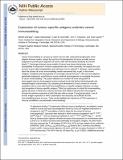Expression of tumour-specific antigens underlies cancer immunoediting
Author(s)
DuPage, Michel J.; Mazumdar, Claire; Schmidt, Leah Marie; Cheung, Ann; Jacks, Tyler E.
DownloadJacks_Expression of.pdf (1.789Mb)
PUBLISHER_POLICY
Publisher Policy
Article is made available in accordance with the publisher's policy and may be subject to US copyright law. Please refer to the publisher's site for terms of use.
Terms of use
Metadata
Show full item recordAbstract
Cancer immunoediting is a process by which immune cells, particularly lymphocytes of the adaptive immune system, protect the host from the development of cancer and alter tumour progression by driving the outgrowth of tumour cells with decreased sensitivity to immune attack1, 2. Carcinogen-induced mouse models of cancer have shown that primary tumour susceptibility is thereby enhanced in immune-compromised mice, whereas the capacity for such tumours to grow after transplantation into wild-type mice is reduced2, 3. However, many questions about the process of cancer immunoediting remain unanswered, in part because of the known antigenic complexity and heterogeneity of carcinogen-induced tumours4. Here we adapted a genetically engineered, autochthonous mouse model of sarcomagenesis to investigate the process of cancer immunoediting. This system allows us to monitor the onset and growth of immunogenic and non-immunogenic tumours induced in situ that harbour identical genetic and histopathological characteristics. By comparing the development of such tumours in immune-competent mice with their development in mice with broad immunodeficiency or specific antigenic tolerance, we show that recognition of tumour-specific antigens by lymphocytes is critical for immunoediting against sarcomas. Furthermore, primary sarcomas were edited to become less immunogenic through the selective outgrowth of cells that were able to escape T lymphocyte attack. Loss of tumour antigen expression or presentation on major histocompatibility complex I was necessary and sufficient for this immunoediting process to occur. These results highlight the importance of tumour-specific-antigen expression in immune surveillance, and potentially, immunotherapy.
Date issued
2012-02Department
Massachusetts Institute of Technology. Department of Biology; Massachusetts Institute of Technology. School of Science; Koch Institute for Integrative Cancer Research at MITJournal
Nature
Publisher
Nature Publishing Group
Citation
DuPage, Michel J. et al. “Expression of Tumour-specific Antigens Underlies Cancer Immunoediting.” Nature 482.7385 (2012): 405–409.
Version: Author's final manuscript
ISSN
0028-0836
1476-4687